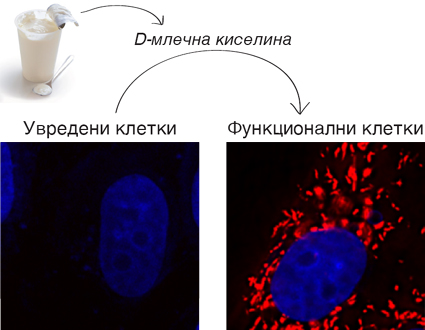
There are a number of written evidence about the origin of Bulgarian yogurt and its beneficial effects on human health. According to recent studies, it might even be a key to the treatment of Parkinson's disease. This is what the team of Prof. Teymuras Kurzchalia from the Max Planck Institute of Molecular Cell Biology and Genetics say. Young Bulgarian scientist Sider Penkov * also works as part of the team.
"Our findings are based on experiments with Caenorabditis elegans worm that we use as an important genetic model for the study of various diseases,” he says. “These worms can survive without any water provided that a certain gene called DJ -1operates normally. Damage to this gene is responsible for the progression of Parkinson’s symptoms in the majority of patients. The discovery is that this gene is responsible for producing two simple substances - glycolic acid and D-lactic acid. Studies have shown that if these substances are provided to damaged nerve cells, they might recover their normal state. Fortunately, yogurt is a food product rich in D-lactic acid, so it can be used for prevention or treatment of Parkinson's disease."
 The discovery has been patented, but scientific work continues. Now the most important is to understand the mechanism of action of D-lactic acid. Preliminary clinical studies with healthy volunteers are yet to come. But how long will these studies take?
The discovery has been patented, but scientific work continues. Now the most important is to understand the mechanism of action of D-lactic acid. Preliminary clinical studies with healthy volunteers are yet to come. But how long will these studies take?
"It is difficult to say. Pre -clinical studies will take about six months. Then the Ethics Commission needs to approve clinical trials with patients. If that happened, it would take another two years for implementation of the trials. Unfortunately, this cannot happen quickly."
During discussions with various experts in the field, the team of Prof. Kurzchalia concluded that not all cultures that are used in the production of yogurt, produce the necessary quantities of D-lactic acid. It turns out that the rich sources of D-lactic acid are the typical Bulgarian cultures.
Prestigious media like "Bild" and The Times wrote about the discovery that received many positive reviews. Still some critics say it gives too much hope for patients with Parkinson's. According to Sider Penkov, professor Kurzchalia is optimistic about the results of the discovery. Recently, the professor paid a visit to Bulgaria at the invitation of the Bulgarian Academy of Sciences and held a lecture on the latest discoveries related to Parkinson's disease. He met scientists and licensed manufacturers of yogurt starters, such as LB Bulgaricum and Genesis, as well as representatives of the Association of Dairy Processors in Bulgaria.
If Bulgarian yogurt actually turned out to be the key to combating the disease, the discovery could provoke the interest of other researchers:
“Bulgarian yogurt could have therapeutic benefits in relation to a number of other diseases. The connection with Parkinson's disease was made because of the ability of D-lactic acid to restore the function of the mitochondria which are the energy producers in a cell. Many other diseases are actually the result of malfunctioning of these small power plants, which means yogurt may be useful for the treatment of other neurodegenerative diseases," says the young Bulgarian scientist in conclusion.
* After successfully graduating in "Molecular Biology" from the "St. Kliment Ohridski" Sofia University he won a scholarship of the Max Planck Society for Research and in 2011 completed a PhD in the laboratory of Professor Kurzchalia. He has been working on research projects related to metabolism disorders.
English: Alexander Markov
From the first attempts to fly with homemade wings back in the 19th century, to the world's first combat flights with reconnaissance and bombing purposes. From the first successful landing of an airplane with a stopped engine in history, to the world's..
On the night of 19-20 January - the celebration of Yordanovden (Epiphany) and Ivanovden (St. John's Day) in the Julian calendar - the northwestern town of Kula will host the traditional "Kapachi" ("Bathing") ritual. This is a unique event, with a..
Interest in the exhibitions and events at the Regional History Museum in Ruse on the Danube is growing. In the last 12 months, it had 95 966 visitors, which is 5 209 more people than in 2023, which is more than in the pre-pandemic years, the institution..
Babinden, or Midwives' Day, was once again this year celebrated across the country with songs, dances and ritual re-enactments. The day of midwifery was..
Bulgaria ranks last among EU Member States in terms of life satisfaction. This is according to Eurostat data for 2023 published today . With an average..
Bulgarian gardeners have been bringing the glory of Bulgaria to Croatia for more than a century and a half. They were true "ambassadors" of the humble..

+359 2 9336 661
